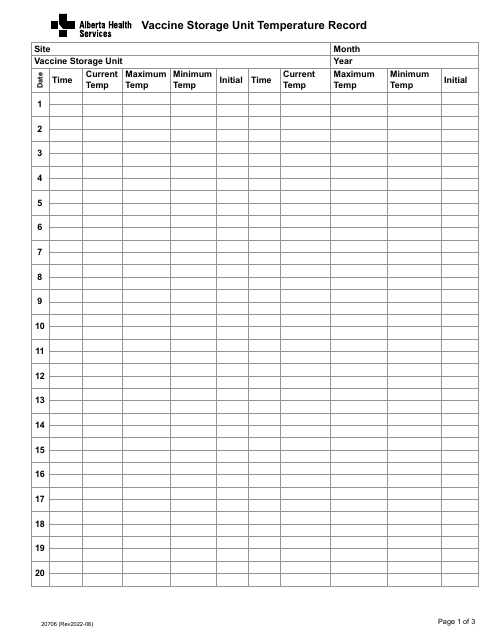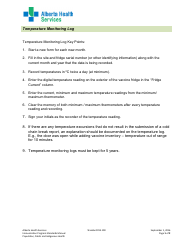Form 20706 Vaccine Storage Unit Temperature Record - Alberta, Canada
Form 20706 Vaccine Storage Unit Temperature Record is a document used in Alberta, Canada to maintain an accurate record of the temperatures in which vaccines are stored. The form helps ensure that vaccines are kept at their required cold storage temperatures to maintain their efficacy. Therefore, healthcare professionals use this form to document daily minimum and maximum temperatures of vaccine storage units.
The Form 20706 Vaccine Storage Unit Temperature Record is filed by medical facilities such as hospitals, clinics and pharmacies in Alberta, Canada. The individuals primarily responsible for maintaining and recording this log are healthcare professionals who handle vaccines, including physicians, nurses, and medical technicians. They document the temperature of the vaccine storage units to ensure that vaccines are stored under appropriate conditions, both to adhere to health regulations and to guarantee vaccine effectiveness.
FAQ
Q: What is Form 20706 Vaccine Storage Unit Temperature Record?
A: Form 20706 is a document utilized in Alberta, Canada, to maintain records of vaccine storage unit temperatures. It ensures proper storage conditions of vaccines, thus preserving their effectiveness.
Q: Why is precise temperature recording necessary for vaccine storage?
A: Maintaining the proper temperature in vaccine storage units is crucial to prevent them from becoming less potent or even ineffective. Some vaccines are heat-sensitive and may be damaged if kept too warm. Others can be damaged if frozen. Ensuring correct temperatures in storage and transit is essential for vaccine viability.
Q: What is the recommended temperature range for storing vaccines in Alberta, Canada?
A: According to the Alberta Immunization Policy, most vaccines should be stored between +2°C and +8°C. However, certain vaccines may require different storage conditions. Always refer to the specific vaccine product monograph for the correct temperature.
Q: Who should complete Form 20706 in Alberta, Canada?
A: Form 20706 should be accurately completed and regularly updated by health care practitioners who are responsible for vaccine storage in Alberta.
Q: How often is Form 20706 updated in Alberta, Canada?
A: The Form 20706 should ideally be updated twice a day to ensure consistent temperature monitoring and effective vaccine storage. Entries should typically be made first thing in the morning and last thing in the evening, but the exact frequency may be specified by the public health authority.
Q: What action is needed if the temperature on Form 20706 is out of the recommended range for vaccines?
A: If the temperature recorded on Form 20706 is outside the recommended range, the vaccines could potentially be compromised. Health practitioners should report the issue immediately to the appropriate public health authority to determine the next steps, including potential vaccine relocation or disposal.







